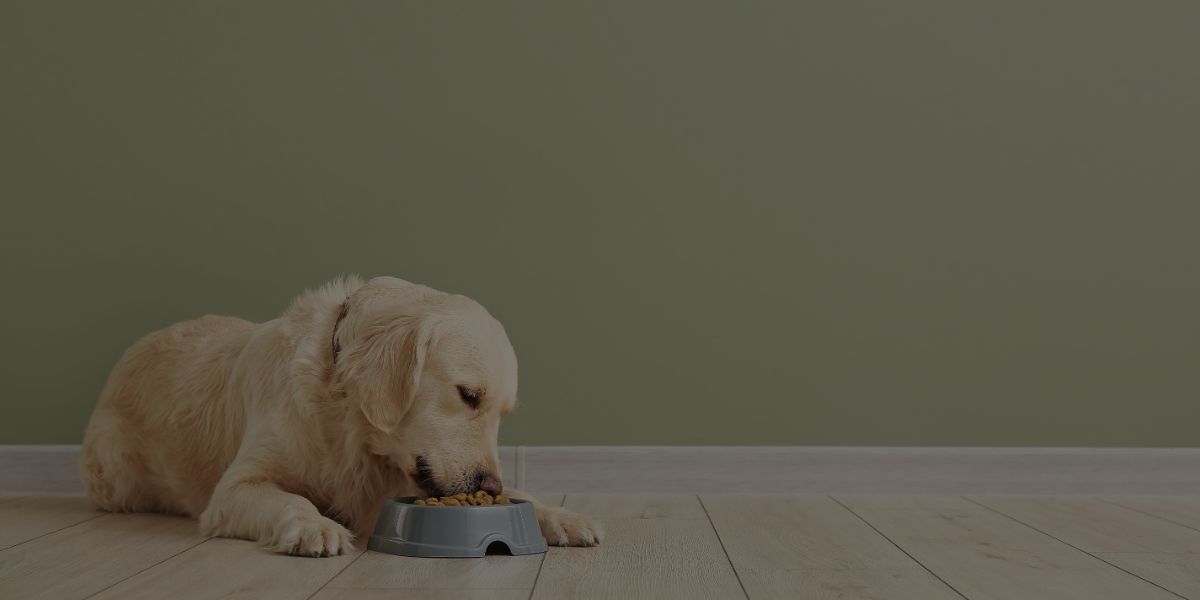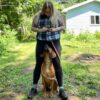If you’re thinking of opening your own doggy daycare, or are already running one, it’s important to make sure that you’re providing safe and healthy nutrition for the dogs in your care. After all, dogs need a balanced diet just like people do – and if they don’t get it, they can become sick. In this blog post, we’ll discuss some basics of canine diets and how to provide safe nutrition at doggy daycare.
So, let’s jump right in!
What to Know About Canine Nutrition
First and foremost, it’s important to understand that dogs require different nutrition than humans.
The primary focus of their diet should be animal-sourced proteins, like beef, chicken, and fish. This should make up the bulk of their calories each day. Furthermore, fats are also an important part of a canine’s diet. These provide energy and essential fatty acids, which help with healthy skin and coat.
Carbohydrates, like rice and potatoes, should make up a smaller portion of their diet. However, they can still be important in providing energy and essential vitamins and minerals. Dogs also benefit from eating vegetables like carrots or celery, as well as fruits like apples or blueberries.
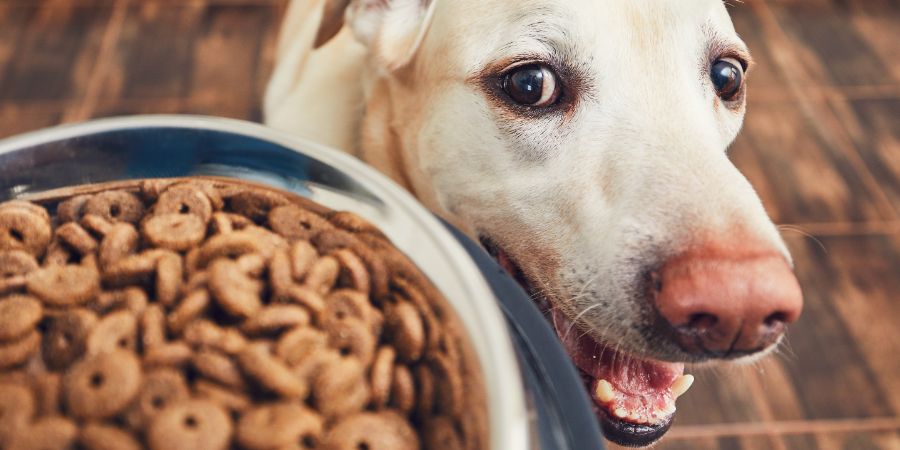
Unsafe Food for Dogs
That said, there are plenty of vegetables and fruits that are unsafe for dogs, such as:
- Grapes and raisins
- Onions
- Garlic
- Chocolate
- Certain type of nuts and seeds (e.g. Macadamia nuts, raw cashews, pecans, pistachios, almonds, fruit seeds, etc.)
- Chives
- Corn on the cob (the cob specifically)
- Avocado
- Cooked bones
What’s more – artificial sweeteners, such as xylitol, can also be fatally poisonous for dogs. So, it’s important to avoid offering any of these items at your doggy daycare.
What’ll Happen if Dogs Eat These Unsafe Foods?
If a dog eats any of the listed unsafe foods or ingredients, it can cause serious health issues and even death. Symptoms vary depending on what was ingested, but common indicators include vomiting, diarrhea, seizures and tremors. So, it’s best to contact your veterinarian if you suspect that a dog at your daycare facility has eaten something they shouldn’t have.
What is Safe for a Dog to Eat on a Daily Basis?
When it comes to providing safe nutrition for doggy daycare, it’s important to make sure that the food you’re feeding is balanced and appropriate.
Start by looking at the ingredients list of a dog food. The first few items listed should be animal-sourced proteins. If they’re not, then this isn’t a good option. Avoid any foods with by-products, fillers, or artificial colors and flavors.
In addition to commercial dog food, a dog can also eat table scraps in moderation – so long as it’s healthy foods, of course. Lean meats, like chicken or fish, are always a good option. However, they should NEVER be fed anything sugary or fatty; these types of foods can lead to obesity and can be dangerous to a dog’s health.
Finally, always make sure that there is plenty of fresh, clean water available throughout the day. This will help keep your furry friends hydrated and healthy! In terms of what a dog can – and should – consume on a daily basis, water is definitely at the top of the list!
Pro Tip: Interested in starting your own doggy daycare business? Here’s everything you need to know!
Should You Be Recommending Food to Doggy Daycare Clients?
As a doggy daycare professional, it’s not your job to tell clients what specific food they should be feeding their dogs. Rather, this sort of recommendation is best left to their veterinarian, as each dog has individual dietary needs.
However, what you CAN do is provide general guidelines for nutrition, like:
- Maintaining a balanced diet (and how to do so);
- How to avoid unsafe foods;
- How to properly read food labels;
- Researching good ingredients online;
- The pros and cons of organic vs. store-bought dog food;
- The pros and cons of carnivorous vs. vegan/vegetarian diets;
- Animal and insect protein sources;
- The pros and cons of a raw diet vs. a cooked diet;
- Vitamins and supplements;
- Wet food vs. dry food, etc.
Tips for Providing Safe Nutrition at Doggy Daycare
Now that we’ve discussed the basics of canine nutrition, let’s talk about how to provide safe nutrition at doggy daycare. With the help of these tips, you can be sure that the dogs in your care are receiving all the nourishment they need while also avoiding unhealthy or unsafe food items!
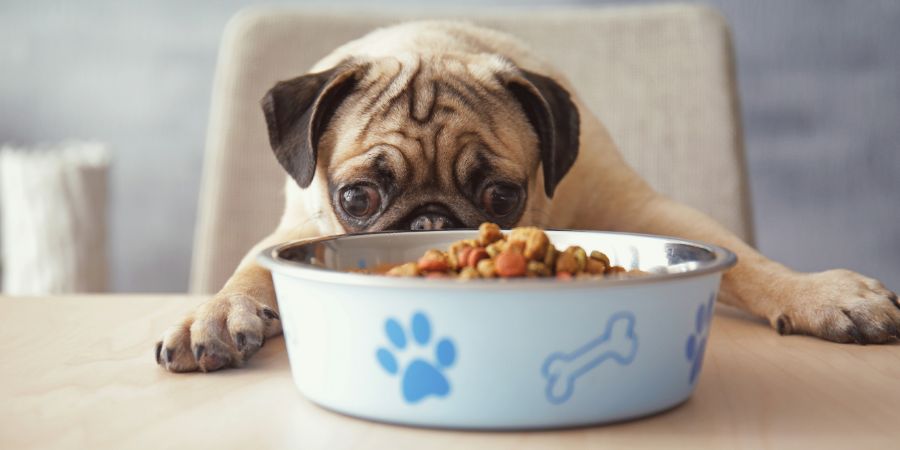
Tip #1: Know Whether Your Client is Providing the Food or Not
Before welcoming a new dog to your daycare, ask their owner whether they’re providing the food or if you’ll be responsible. If they are, then make sure that the food is appropriate for their pup’s dietary needs (i.e., not overly rich in carbohydrates).
Tip #2: Inquire About Special Dietary Needs
Dogs can have allergies and sensitivities to certain ingredients. Ask your clients if their pup has any dietary restrictions and/or allergies so that you can cater to their needs accordingly.
Tip #3: Invest in Quality Food and Supplies
Investing in quality food is essential for maintaining a healthy and safe diet at doggy daycare. This means purchasing fresh, human-grade ingredients as well as high-quality dog food. Additionally, make sure to provide your canine guests with clean bowls and toys that won’t harbor bacteria or mold.
Tip #4: Check All Doggy Daycare Food Labels
Before you serve any particular type of food or treat at your doggy daycare, make sure to read the nutrition label and check for any potentially harmful ingredients.
How to Read Dog Food Nutrition Labels
Reading the nutrition label on a bag of dog food can be confusing. Luckily, we’ve got some key tips to help you decode it:
- Look for the “guaranteed analysis” section, which will provide an overview of the macronutrients (e.g., protein, fat, fiber);
- Additionally, look for vitamins and minerals contained in the food;
- Avoid any foods with artificial colors, flavors and preservatives;
- And check the expiration date to make sure it is still safe to eat.
Tip #5: Rotate Your Doggy Daycare Menu
We also recommend rotating your doggy daycare menu every few weeks. This will ensure that the dogs in your care are receiving a variety of different nutrient sources and won’t get bored with their meals!
Tip #6: Have Alternate Means of Providing Nutrition for a Dog Who Won’t Eat
Sometimes, especially for new arrivals, a dog won’t eat the food you provide. This could be due to anxiety or stress. Either way, in this case, it’s best to have an alternate means of providing nutrition for them.
Boiled chicken and rice, or a homemade meal from their owner’s recipe, are great examples!
And if they still refuse to eat?
Offer them a special treat, like freeze-dried liver or a few pieces of their favorite kibble!
Pro Tip: Want to learn more about doggy daycare as a whole, and what it entails? This article breaks down ALL of the basics!
Tip #7: ALWAYS Have Plenty of Fresh Water Available
As we discussed earlier, water is essential for a healthy diet. So, make sure that your doggy daycare always has plenty of fresh water available, and give each pup their own bowl if possible.
Tip #8: Educate Your Clients
Lastly, and as we briefly mentioned earlier, providing education about nutrition is a great way to help keep the dogs in your care healthy and safe. Let your clients know that you are providing a nutritious and balanced diet for their pup, and provide helpful tips on what they can do at home to ensure their pet’s continued health.
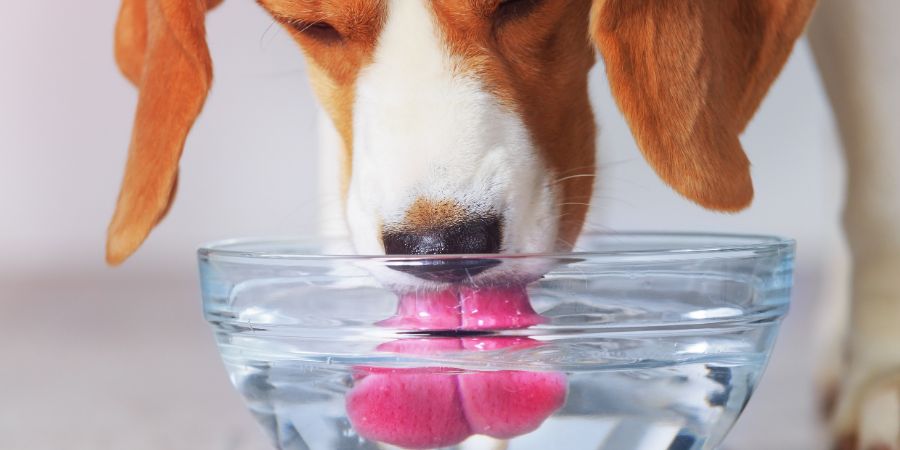
How to Add Nutrition to Homemade Dog Food
Perhaps your client has opted to make their own dog food. In this case, you can recommend adding essential nutrients like omega-3 fatty acids and probiotics to the food. Both of these will help support a pup’s overall health and well-being!
Additionally, for an extra nutrient boost, consider incorporating some fresh fruits and vegetables into their meals as well. (So long as you make sure they know which ones to avoid, of course!)
What Homemade Food is Good for Dogs?
Now, let’s say that your client wishes to make and provide their own homemade dog food, but doesn’t know where to start. If they come to you for your expertise on the subject, you can advise them to look for foods that contain lean protein sources like chicken, beef, and fish. Additionally, provide a few ideas on which vegetables to incorporate into their pup’s meals, such as carrots, peas, squash, and zucchini.
Managing Dietary Restrictions
Okay, so what should you do if your client’s dog DOES have a dietary restriction?
In this case, you’ll want to make sure that you are informed about the specific type of food or treats that must be avoided. Some doggy daycares will even create special diets for those with allergies or sensitivities.
This will require a bit more work on your end… But it’s an important measure to take if you want to keep the dogs in your care healthy and safe!
Toxins and Potential Hazards
We certainly can’t discuss safe nutrition at doggy daycare without mentioning toxins and potential hazards. After all, any pet owner should be aware of the risks associated with certain foods and treats… And as a dog care professional, you ESPECIALLY need to know these things!
Therefore, you must make sure that all food is stored properly, kept away from pets when not in use, and inspected for any signs of spoilage or contamination. It’s also important to look out for items that may contain toxins, like chocolate, onions, or grapes.
Furthermore, you need to ensure that your doggy daycare facility doesn’t contain any harmful plant life that any of the dogs can wind up ingesting. If you’re not sure which plants are toxic to dogs, we strongly suggest checking out this list by PetMD.
Choking Hazards
On top of food, you’ll need to watch out for choking hazards as well.
Keep all small items (like chew toys and bones) away from puppies, as they can easily put these things in their mouths without realizing the risk. Additionally, be sure to inspect any treats or chews before giving them to the pups in your care. If they are too small, too hard, or have sharp edges, they should not be given to the dogs.
Finally, never leave a pup unattended with a chew toy or bone, as these items can pose serious choking hazards if left unchecked.
The Importance of Knowing First Aid for Dogs
Knowing how to administer first aid in the event of an emergency can be a life-saving skill. Therefore, we highly recommend brushing up on your canine first aid knowledge and ensuring that all staff members are prepared for these scenarios as well. After all, if you’re running your own doggy daycare, you should know how to:
- Perform CPR;
- Stop bleeding;
- Administer medications;
- Recognize and properly respond to allergic reactions;
- Handle seizures;
- Treat burns and wounds;
- Perform the Heimlich maneuver for dogs, etc.
Not only will having these skills give your clients peace of mind; they’ll also ensure that every pup in your care is truly in the best, safest hands!
Fun Fact: As part of QC Pet Studies’ self-paced, online Dog Daycare Course, you’ll receive our First Aid Course absolutely FREE!
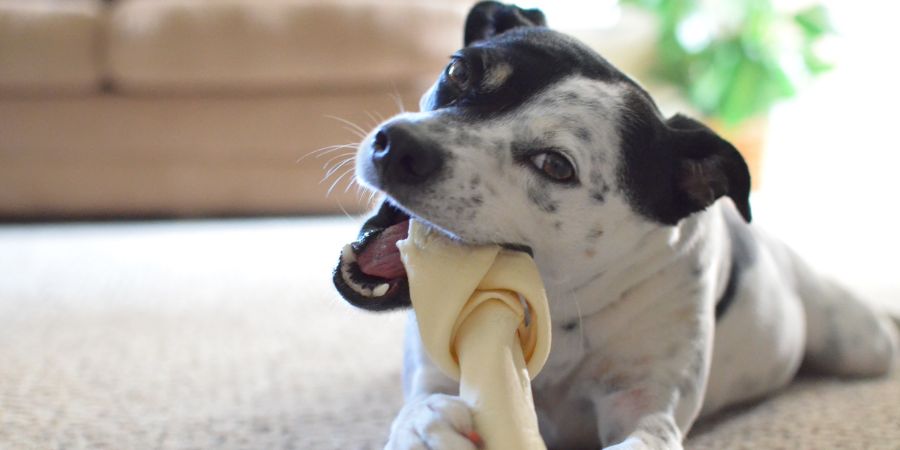
Staying Up to Date with Nutrition Guidelines
Finally, as a dog care professional, it’s your responsibility to stay up to date on nutrition guidelines for both puppies and adult dogs. After all, the needs of each will vary depending on their age, breed, size, and activity level.
In addition to providing clients with general nutrition advice, you should be able to answer any questions they may have regarding specific foods or treats. Just make sure that the information you provide is accurate and up-to-date, as this will help ensure that the pups in your care are receiving the best possible nutrition.
Conclusion
At the end of the day, knowing how to provide your canine guests with safe nutrition is an important part of being a successful doggy daycare owner. Not only will this ensure that all pups in your care remain healthy and happy; it’ll also give clients peace of mind, knowing their dogs are in good hands!
We hope this article has helped you understand the importance of proper nutrition for dogs at doggy daycare. With that being said, if you’re looking to learn how to provide top-quality dog care services and start your own successful business, be sure to check out QC Pet Studies‘ self-paced, online Dog Daycare Course! Not only will it teach you everything there is to know about running a successful doggy daycare – it’ll also give you access to our FREE First Aid Course!
Best of luck and thanks for reading!
